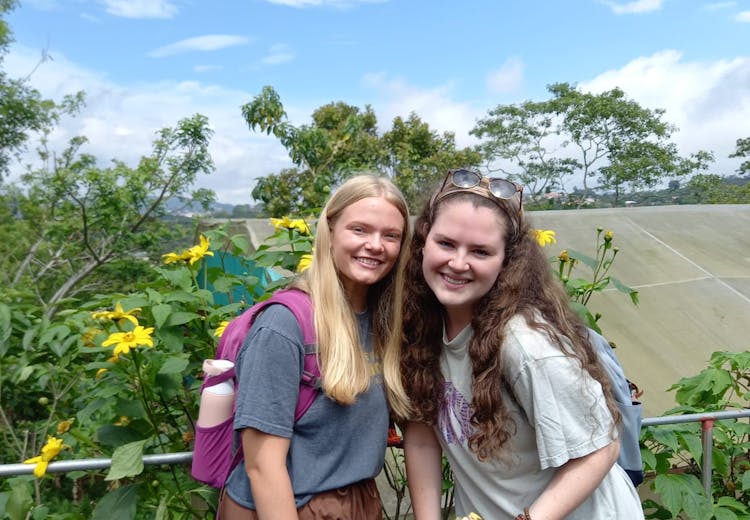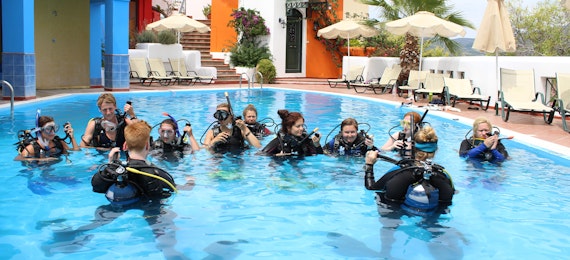
Wildlife Veterinary Internships: Intern abroad in Costa Rica
In this rewarding Costa Rica internship program, interns help care for injured and displaced wildlife, assisting local vets with treatment and rehabilitation. This internship is strongly focused on the care, rehabilitation and release of national wildlife. Interns will learn from and assist experienced veterinarians, gaining a deeper understanding of rehab techniques, animal well-being, and conservation initiatives.
What to expect from your Wildlife Veterinary internship:
- Enhance your knowledge of veterinary medical procedures by shadowing full-time vets.
- Gain insight into daily life in an animal sanctuary rescue center and increase your practical skills.
- Make a significant contribution to the health and protection of animals.
Your internship abroad host organization:
- Animal Sanctuary and Rescue Center
Internship details
Wildlife Veterinary internships in Costa Rica take place in San Josecito, part of the municipality of Heredia, approximately 11 miles from Costa Rica’s capital, San Jose. This internship is your chance to make a real difference in the lives of animals, while gaining experience in the field of animal care, and boosting your resume.
This is an in-country internship, with accommodation and select meals provided. You can explore remote internships, if you are looking for an internship program that you can undertake from home.
Wildlife Veterinary interns in Costa Rica assist to support an Animal Sanctuary and Rescue Center. The sanctuary operates to foster sick and injured wildlife, providing in-house care and rehabilitation through their onsite veterinary clinic.
Located in San Josecito, approximately 35-minute’s from San Jose, participants should come prepared to network directly with local sanctuary staff, or other program volunteers/externs/interns, as this site is not situated near to other internship placements in Costa Rica. However, nearby amenities include small convenience stores (within walking distance), as well as easy access to supermarkets and shopping malls, via public transportation.
As a Wildlife Veterinary intern, you’ll collaborate alongside a team of experts and veterinarians, all actively working to provide the animals with a safe and nurturing environment. You will have a broad range of tasks to collaborate with, ranging from assisting vet doctors with medical procedures, feeding, bathing, administering medicine, and cleaning cages to supporting conservation efforts, and assisting with animal rehabilitation, treatment, and diagnoses.
Local staff specifically run this “externship” program, to provide valuable learning experiences for students, wildlife enthusiasts, and young professionals. In addition to the “externship” program, the Sanctuary may also accommodate international volunteers, who assist with less skilled tasks. Interns with higher degrees of professional qualification, who can dedicate a minimum of 4 months to the Center’s operations, may likewise be present, to support the activities of the externship.
In all cases, interns should expect that the first week of your experience will focus on settling in and gaining some introductory knowledge. Understand and expect that individual internship experiences vary, as some interns are at a more advanced level than others. If you’re at a more introductory level, you should reasonably expect a more introductory internship. Likewise, if you’re interning for a shorter duration, you will have a different experience from someone who is interning for a longer duration. Interns should be adaptable, proactive and willing to help where it’s needed.
Ensure that you ask questions and provide feedback during the introductory period, so that your supervisor understands how you’re progressing, and what your interests and abilities are. This will help them to support your professional development, within reasonable boundaries. Preferences are always subject to availability.
Typical Schedule
-
Approx. 7am to 4pm, Monday to Friday. Occasionally, weekend activities may arise, depending on wildlife rescue priorities, but this will be optional and subject to availability.
What are the career benefits of interning abroad as a Wildlife Veterinary Intern?
Wildlife Veterinary interns learn from a qualified and experienced supervisor, and can be involved in:
-
Assisting with diagnosing and treating animals.
-
Assisting with examinations and treatments.
-
Feeding and monitoring wildlife.
-
Supporting maintenance related to animal enclosure and zookeeping.
-
Record keeping.
Professional development opportunities:
-
Gain an in-depth understanding of rehabilitation techniques and best practices.
-
Assist experienced veterinarians.
-
Support meaningful conservation and wildlife preservation efforts.
-
Learn to evaluate the quality of rehab animals’ diets.
-
Develop your communication skills through teamwork and outreach programs.
-
Gain practical skills and boost your employability, with guidance from Intern Abroad HQ’s Experiential Learning Curriculum to support your learning and cultural intelligence.
Are you eligible for this internship?
Submit a free application so we can confirm your eligibility and check availability for your preferred dates.
Not sure which program to join?
Costa Rica photo gallery

Academic credit available for all internships
Get course credit from your college or university while completing your internship abroad or a remote internship program. It's a great way to meet your academic requirements and gain valuable experience at the same time.
Learn about course creditProgram fees
Applying for our Wildlife Veterinary Internship is completely free! The support package covers the assistance we provide in finding your internship and arranging your living accommodations in your host country, ensuring you thrive during your program.
Please note that a deposit of US$499 is required to confirm your place. The remaining balance (minus your initial US$499 deposit) is due at least 60 days before your internship start date.
Duration |
Program Fee |
|---|---|
| 6 weeks | $3,839 Equivalent to $91 /day |
| 8 weeks | $4,502 Equivalent to $80 /day |
| 10 weeks | $5,219 Equivalent to $74 /day |
| 12 weeks | $5,832 Equivalent to $69 /day |
| 16 weeks | $7,169 Equivalent to $64 /day |
| 20 weeks | $8,473 Equivalent to $60 /day |
| 24 weeks | $9,710 Equivalent to $57 /day |
- Airport pick-up
- Daily breakfast and dinner
- Accommodation
- 24/7 in-country support
- Program orientation
- Dedicated support before, during, and after your internship
- In-country guidance for social and tourist activities
- Sourcing and securing your internship placement
- Personalization of your internship plan
- Coaching from your supervisor
- Documented portfolio of your experiential learnings
- Academic credit facilitation
- International reference letter
- Certificate of Internship Completion
- Lunches
- All in-country transportation
- Transfer back to the airport at the end of your internship program
- Visa (if required), flights, travel insurance (mandatory), vaccinations, criminal background check
- Personal spending money for snacks, drinks, public transport, laundry, and leisure activities during your free time.
Popular add-ons & experiences in San Ramon
Take your internship to the next level with Intern Abroad HQ's affordable activity and tour add-ons in San Ramon! Explore your options below and learn how to book them once you've been accepted onto an internship program.

Discover Costa Rica on our first-ever Americas tour. This 12-day Costa Rica group tour unveils volcanic vistas, pristine beaches, and diverse wildlife including sloths. From adrenaline-pumping activities to serene moments, experience the perfect blend of nature and culture. Enjoy Costa Rica’s stunning landscapes and vibrant communities on this transformative Central American journey.
Spanish lessons
Internships in Costa Rica require interns to have varying levels of Spanish language proficiency, from either a confident level of basic Spanish to a more developed grasp of intermediate language skills. The definition of having basic Spanish skills (Level A2) includes the ability to exchange brief information with questions and answers, use and understand simple language in daily situations and cultural aspects.
Keep in mind that despite you level of proficiency, a language barrier can still be encountered to a certain extent. Interns should be prepared for the very natural and normal frustration of not always understanding what is being said around them. Most interns are able to have a successful internship experience and it is essential to come prepared and willing to surmount a language barrier, as opposed to being intimidated by it.
We strongly recommend that all interns take advantage of the affordable language lessons offered exclusively to Intern Abroad HQ participants by our host organization in Costa Rica. These can be arranged directly with the local team once registered for the program (ask about online Skype lessons) or at the orientation in-country. Language lessons are tailored to each individual’s current level of Spanish and classes run from Monday through to Friday.
Weekends and travel
Interns have the weekends and evenings free and there is no shortage of wonderful things to see and do. (Occasionally, weekend activities may arise, depending on wildlife rescue priorities, but this will be optional and subject to availability).
Some of the most popular excursions and activities include Tortuga Island, Poás Volcano National Park, Doka Coffee Tour and La Paz Waterfall Garden, San Luis Canopy Tour… and much more!
Please consider that attendance at your internship placement is mandatory - you should only travel and book tourism excursions on your days off (which will in most cases be during the weekends). Please plan longer trips and travels for the time before or after your internship period. If you need any travel advice, please feel free to contact us.
To learn about what’s going on during your internship stay, ask at your program orientation. If you’re planning to travel outside of your internship placement location, you should always inform staff and your host family. We recommend that you do not travel alone - always make plans to travel with a friend. Travel during the weekends and holidays so you do not interfere with your internship schedule.
Arrival and Orientation
Wildlife Veterinary internships in Costa Rica take place in San Isidro, a city only 11 miles (or 18 km, approximately a 35-minute drive) from San Jose, the Costa Rican capital. This is easily accessible via bus or taxi.
San Isidro has a very friendly environment, and is located along the lush forests of Braulio Carrillo, one of Costa Rica’s most breathtaking parks. San Isidro’s downtown center offers small convenience stores, malls, and restaurants, and being so close to San Jose, it’s easy to explore all that Costa Rica’s capital has to offer.
The minimum duration requirement is 4 weeks up to a maximum duration of 24 weeks.
Airport pick up and accommodation are included in the Program Fee. The accommodation is covered from the Sunday night before the Monday start date - interns are required to arrive no later than the Sunday before their Monday start date, as all orientations are held on Mondays. If arriving earlier than this date, interns will be required to cover the cost of an “out of hours” airport pick up.
The typical port of entry is the Juan Santamaría International Airport (SJO). If you are planning to spend time independently in Costa Rica prior to your internship and will not require an airport pick up, we can discuss alternative arrival logistics with you. Upon arrival, interns will be met, greeted, and transferred to the accommodation.
The last night of the accommodation is the Saturday night of the final week, leaving interns free to depart on Sunday. Extra nights of accommodation can be arranged in advance, if requested, and are subject to availability.
Orientation covers important details for your internship, including introductions, information about culture, customs, rules, expectations, safety, language lessons, cultural excursions, and more. Your specific internship placement orientation will follow the general orientation, as you’ll be shown how to travel to and from your internship and be introduced to the team you’ll be joining.
Please note that all participants are advised not to book flights until they have first registered to confirm their internship placement.
Check what's required to visit Costa Rica
Check out the widget below to learn about the visa requirements for the Wildlife Veterinary internship in Costa Rica, based on your country of residence.
Accommodation and WiFi
Wildlife Veterinary interns in San Isidro are accommodated with fellow interns and sanctuary volunteers at the rescue center’s housing, located onsite (the sanctuary is a short 6-minute walk from the house).
Nearby amenities include small convenience stores (within walking distance), as well as easy access to supermarkets and shopping malls, via taxis or public transportation.
The sharehouse accommodation includes three bedrooms (two rooms with 3 bunk beds each, and one room with one bunk bed and a single bed). There are two western bathrooms, shared by all guests, a common area, and a kitchen.
The house is in a safe gated community with WiFi. Living is comfortable but basic, and offers electricity and running water. There is also laundry access at the accommodation.
Any alternative accommodation requests must be communicated to the Program Manager in advance.
Meals
Wildlife Veterinary internships in Costa Rica include daily breakfast, lunch, and dinner, served at the shared accommodation.
Dietary requirements and allergies must be communicated in advance - note that the included meals will not fully accommodate vegan diets. In all cases, any additional snacks, treats, takeaways, meal supplementation or other dietary preferences must be independently purchased.
The local cost of food and dining in San Isidro can vary, depending on where you choose to shop and dine. A weekly budget of US$100 is recommended for extra meals and treats. Bear in mind that your weekly budget will be determined by your own personal spending habits and lifestyle choices, so please take this into consideration and plan accordingly.
Essential country information
| Capital | San Jose |
| Population | 5.094 million |
| Languages | Spanish |
| Currency | Costa Rican Colón (CRC) |
| Time zone | UTC−06:00 |
Weather and climate:
Costa Rica is unequivocally a tropical country, situated between 8° and 11° north latitude, fairly close to the equator. Although you get much cooler temperatures in the mountains above 2000 meters, the average annual temperature for most of the country lies between 21.7°C (71°F) and 27°C (81°F). The coolest months are from November through to January, and the warmest months are from March through to May. San Jose stands at approximately 1170 meters altitude and has a mean annual temperature of 20.6°C (69°F).

















































